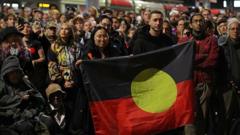During a meeting between President Trump and South African President Cyril Ramaphosa, a video featuring Julius Malema, leader of the Economic Freedom Fighters, was shared, emphasizing Trump's views on race in South Africa and prompting a swift response from Malema himself.
South African Politician Malema Sparks Controversy at White House Meeting

South African Politician Malema Sparks Controversy at White House Meeting
Julius Malema's absence at a significant diplomatic discussion raises questions after a video of his provocative statements was screened by President Trump.
Julius Malema, leader of South Africa's Economic Freedom Fighters (EFF) party, was notably absent from a recent Oval Office meeting between President Donald Trump and South African President Cyril Ramaphosa. However, Malema's presence was felt through a video montage showcasing his controversial apartheid-era chants, which dominated Trump's narrative during discussions about race and land ownership in South Africa.
This video screening occurred amidst Trump's allegations regarding the systemic violence and racism faced by white individuals in South Africa, drawing attention to the significant economic disparities between the country's white minority and its Black majority. Malema, 44, who has garnered attention for his radical policies aimed at reallocating land owned by whites to Black South Africans, remains a polarizing figure. Despite the EFF securing less than 10 percent of the vote in the 2024 elections, his influence continues to reverberate.
In response to the meeting, Malema addressed his critics on social media platform X, retorting, “A group of older men meet in Washington to gossip about me. No significant amount of intelligence evidence has been produced about white genocide.” His past statements, such as the 2023 rally cry of “Kill the Boer,” which targeted Afrikaans-speaking farmers, have significantly contributed to his contentious reputation and the challenges he poses to the status quo in South Africa. The Afrikaner minority has historically been linked to the nation's apartheid regime, adding further complexity to the political discourse surrounding land ownership and racial justice in the country.




















